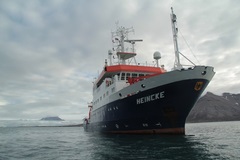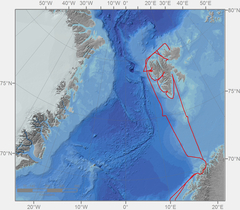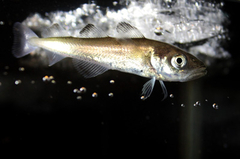Escaping the warmth: The Atlantic cod conquers the Arctic
This article is a reprint of a press release posted by the Alfred Wegener Institute, Helmholtz Centre for Polar and Marine Research (AWI) on Oct 17, 2013.
As a result of climate change the Atlantic cod has moved so far north that it’s juveniles now can even be found in large numbers in the fjords of Spitsbergen. This is the conclusion reached by biologists of the Alfred Wegener Institute, Helmholtz Centre for Polar and Marine Research (AWI), following an expedition to this specific region of the Arctic Ocean, which used to be dominated by the Polar cod. The scientists now plan to investigate whether the two cod species compete with each other and which species can adapt more easily to the altered habitats in the Arctic.
 August 2013. The German research vessel Heincke is heading towards the waters off the north easterly coast of Spitsbergen. On board, six biologists from the Alfred Wegener Institute are preparing for the first fishing haul of their Arctic expedition. They want to catch juvenile Atlantic cod and Polar cod at the 80th parallel north. But as the vessel reaches its destination, the thermometer shows a water temperature of 4.5 degrees Celsius. Far too warm for the Polar cod who prefers temperatures of around 0 degrees. “These warm water masses come from the Atlantic and in the summer months are superimposed on the cold Arctic water masses from the Barents Sea in the fjords,” explains Dr. Felix Mark, biologist at the Alfred Wegener Institute.
August 2013. The German research vessel Heincke is heading towards the waters off the north easterly coast of Spitsbergen. On board, six biologists from the Alfred Wegener Institute are preparing for the first fishing haul of their Arctic expedition. They want to catch juvenile Atlantic cod and Polar cod at the 80th parallel north. But as the vessel reaches its destination, the thermometer shows a water temperature of 4.5 degrees Celsius. Far too warm for the Polar cod who prefers temperatures of around 0 degrees. “These warm water masses come from the Atlantic and in the summer months are superimposed on the cold Arctic water masses from the Barents Sea in the fjords,” explains Dr. Felix Mark, biologist at the Alfred Wegener Institute.
 He is leading the ship expedition to the Arctic. Together with his AWI colleagues and a PhD student from the Heinrich Heine University in Düsseldorf he wants to investigate the spread of Atlantic cod and Polar cod in the fjords of Spitsbergen. However, after the first haul mostly juvenile Atlantic cod are thrashing around in the net: a sign of fundamental changes in the Arctic. “The rising water temperatures mean that Atlantic cod is finding an ideal habitat here. We expect that the juveniles of this species, which used to be at home in the North Sea, are already dominating the warmer surface waters around Spitsbergen,” explains Dr. Felix Mark.
He is leading the ship expedition to the Arctic. Together with his AWI colleagues and a PhD student from the Heinrich Heine University in Düsseldorf he wants to investigate the spread of Atlantic cod and Polar cod in the fjords of Spitsbergen. However, after the first haul mostly juvenile Atlantic cod are thrashing around in the net: a sign of fundamental changes in the Arctic. “The rising water temperatures mean that Atlantic cod is finding an ideal habitat here. We expect that the juveniles of this species, which used to be at home in the North Sea, are already dominating the warmer surface waters around Spitsbergen,” explains Dr. Felix Mark.
His question now is whether and to what extent do Atlantic and Polar cod compete with each other and to what extent an increasing acidification of the ocean influences any rivalry. “Ocean acidification presumably not only has an effect on the bodily functions of both fish species but also influences their prey,” says Dr. Felix Mark.
 Whilst the Atlantic cod hunts different copepods, sea butterflies and also small fish, and therefore enjoys a varied diet, the Polar cod only has its sights set on certain types of crustaceans. However, if they were available only in small amounts due to the increasing acidification of the Arctic waters, the Polar cod would be left with little to eat. “The aim of our expedition to Spitsbergen was therefore to catch Atlantic cod, Polar cod and their main prey, the copepods, and to transport the animals alive to Bremerhaven. Only in our laboratories do we have the opportunity to examine how the fish and the zooplankton react to a drop in the pH value of the water”, says the biologist.
Whilst the Atlantic cod hunts different copepods, sea butterflies and also small fish, and therefore enjoys a varied diet, the Polar cod only has its sights set on certain types of crustaceans. However, if they were available only in small amounts due to the increasing acidification of the Arctic waters, the Polar cod would be left with little to eat. “The aim of our expedition to Spitsbergen was therefore to catch Atlantic cod, Polar cod and their main prey, the copepods, and to transport the animals alive to Bremerhaven. Only in our laboratories do we have the opportunity to examine how the fish and the zooplankton react to a drop in the pH value of the water”, says the biologist.
He and his colleagues suspect that the Atlantic cod can adapt better to increased ocean acidification and will therefore be able to displace the Polar cod from the common habitat in this way. “A fight for the upper hand like this would have far-reaching consequences for the Arctic ecosystem because the Polar cod is an important part of the Arctic food web and food for other fish species as well as birds and marine mammals such as whales or seals,” says Dr. Felix Mark.
The investigations into the Atlantic and Polar cod are part of BIOACID, the national research project on ocean acidification. The name is an acronym for “Biological Impacts of Ocean Acidification“ within which 14 institutes explore how marine organisms react to ocean acidification and the impact on the food web, the ecosystems in the sea and ultimately also on the economy and society. Dr. Felix Mark heads the so-called fish consortium as part of this programme.
Further information on ocean acidification research at the Alfred Wegener Institute is also to be found in the “Focus” column of the AWI website: http://www.awi.de/en/news/focus/2013/ocean_acidification/.
The Alfred Wegener Institute also reported on the Atlantic cod in its press release of 17 April 2013:
Follow the Alfred Wegener Institute on Twitter and Facebook for all current news and information on everyday stories from the life of the Institute.
The Alfred Wegener Institute conducts research in the Arctic and Antarctic and in the high and mid-latitude oceans. The Institute coordinates German polar research and provides important infrastructure such as the research ice breaker Polarstern and stations in the Arctic and Antarctic to the international scientific world. The Alfred Wegener Institute is one of the 18 research centres of the Helmholtz Association, the largest scientific organisation in Germany.
Posted by John Hartz on Monday, 28 October, 2013
 August 2013. The German research vessel Heincke is heading towards the waters off the north easterly coast of Spitsbergen. On board, six biologists from the Alfred Wegener Institute are preparing for the first fishing haul of their Arctic expedition. They want to catch juvenile Atlantic cod and Polar cod at the 80th parallel north. But as the vessel reaches its destination, the thermometer shows a water temperature of 4.5 degrees Celsius. Far too warm for the Polar cod who prefers temperatures of around 0 degrees. “These warm water masses come from the Atlantic and in the summer months are superimposed on the cold Arctic water masses from the Barents Sea in the fjords,” explains Dr. Felix Mark, biologist at the Alfred Wegener Institute.
August 2013. The German research vessel Heincke is heading towards the waters off the north easterly coast of Spitsbergen. On board, six biologists from the Alfred Wegener Institute are preparing for the first fishing haul of their Arctic expedition. They want to catch juvenile Atlantic cod and Polar cod at the 80th parallel north. But as the vessel reaches its destination, the thermometer shows a water temperature of 4.5 degrees Celsius. Far too warm for the Polar cod who prefers temperatures of around 0 degrees. “These warm water masses come from the Atlantic and in the summer months are superimposed on the cold Arctic water masses from the Barents Sea in the fjords,” explains Dr. Felix Mark, biologist at the Alfred Wegener Institute. He is leading the ship expedition to the Arctic. Together with his AWI colleagues and a PhD student from the Heinrich Heine University in Düsseldorf he wants to investigate the spread of Atlantic cod and Polar cod in the fjords of Spitsbergen. However, after the first haul mostly juvenile Atlantic cod are thrashing around in the net: a sign of fundamental changes in the Arctic. “The rising water temperatures mean that Atlantic cod is finding an ideal habitat here. We expect that the juveniles of this species, which used to be at home in the North Sea, are already dominating the warmer surface waters around Spitsbergen,” explains Dr. Felix Mark.
He is leading the ship expedition to the Arctic. Together with his AWI colleagues and a PhD student from the Heinrich Heine University in Düsseldorf he wants to investigate the spread of Atlantic cod and Polar cod in the fjords of Spitsbergen. However, after the first haul mostly juvenile Atlantic cod are thrashing around in the net: a sign of fundamental changes in the Arctic. “The rising water temperatures mean that Atlantic cod is finding an ideal habitat here. We expect that the juveniles of this species, which used to be at home in the North Sea, are already dominating the warmer surface waters around Spitsbergen,” explains Dr. Felix Mark. Whilst the Atlantic cod hunts different copepods, sea butterflies and also small fish, and therefore enjoys a varied diet, the Polar cod only has its sights set on certain types of crustaceans. However, if they were available only in small amounts due to the increasing acidification of the Arctic waters, the Polar cod would be left with little to eat. “The aim of our expedition to Spitsbergen was therefore to catch Atlantic cod, Polar cod and their main prey, the copepods, and to transport the animals alive to Bremerhaven. Only in our laboratories do we have the opportunity to examine how the fish and the zooplankton react to a drop in the pH value of the water”, says the biologist.
Whilst the Atlantic cod hunts different copepods, sea butterflies and also small fish, and therefore enjoys a varied diet, the Polar cod only has its sights set on certain types of crustaceans. However, if they were available only in small amounts due to the increasing acidification of the Arctic waters, the Polar cod would be left with little to eat. “The aim of our expedition to Spitsbergen was therefore to catch Atlantic cod, Polar cod and their main prey, the copepods, and to transport the animals alive to Bremerhaven. Only in our laboratories do we have the opportunity to examine how the fish and the zooplankton react to a drop in the pH value of the water”, says the biologist.
